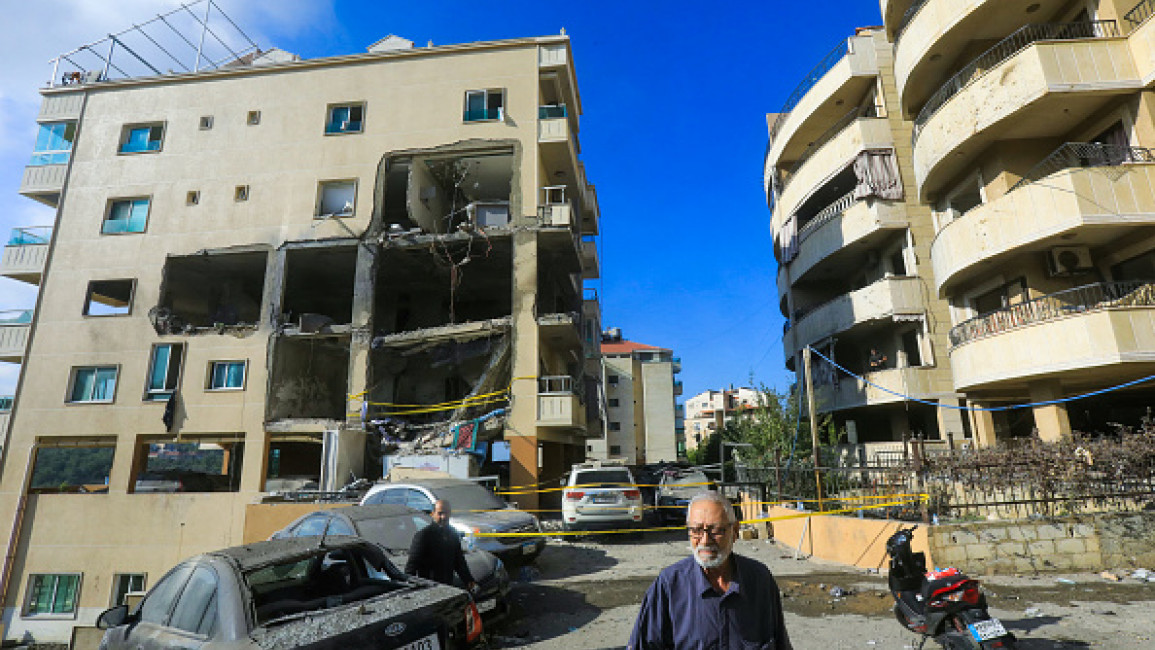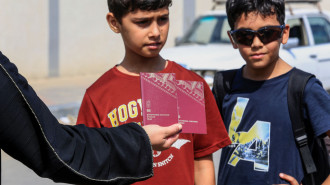Israel strikes Beirut's southern suburbs for second day amid widening assault
Israel pounded Beirut's southern suburbs for a second day on Wednesday, as one Mount Lebanon town was attacked for the first time.
The violence comes a day after the Israeli military said it was widening its ground offensive in the country’s south.
The Israeli military issued evacuation orders for several municipalities in Dahiyeh, the name given to the densely populated and urban area south of the Lebanese capital with strikes beginning just minutes later.
Ghobeiry’s Mayor Maan Khalil, whose municipality was targeted repeatedly, told Al-Araby TV that the Israeli army was targeting civilian residential areas, and the strikes were causing massive destruction.
Wednesday's raids came after a long day of attacks on the area both Tuesday morning and overnight, which levelled some buildings and resulted in widespread destruction.
There were no reported casualties as the vast majority of Dahiyeh's residents had fled, with many sheltering in Beirut and other parts of the country.
Some observers view the intensified attacks on civilian areas as a way of pressuring Hezbollah amid reported ceasefire talks.
Negotiations have not yet yielded results, as Beirut claims some of the tough Israeli demands would breach the country's sovereignty so are unacceptable.
Aramoun hit for the first time
A drone strike early Wednesday severely damaged a residential building in Aramoun, a hilltop town southeast of Beirut, killing at least six people according to an initial toll.
Local media said body parts were found at the site and the death toll is likely to rise with another 15 people injured.
Search and rescue operations were underway, according to state news agency NNA.
Israel in recent days has struck several towns and villages outside regions considered Hezbollah strongholds with dozens of civilians killed, including attacks on buildings where displaced families are staying.
Aramoun, located in the Aley district of Mount Lebanon, is one of the towns that has welcomed a significant number of the more than one million displaced persons.
On Tuesday evening, a residential building in the village of Joun was also attacked, killing more than a dozen people including at least one child. Others are still reportedly missing, and the death toll is expected to rise.
Joun is a mixed Christian and Shia town in Mount Lebanon's Chouf district, only 13 kilometres (around eight miles) away from the coastal city of Sidon. It has been struck once before.
Almat, Ain Yaaqoub, and Baalchmay are other villages which were attacked last week killing scores of people, including women and children.
Ground offensive widens
In southern Lebanon, at the forefront of the war, the Israeli military said it assassinated Mahmoud Mousa Saleh who commanded the Khiam sector in Hezbollah, the latest commander to be taken out.
The border town of Khiam, situated on a strategic hilltop, has witnessed heavy clashes between Hezbollah fighters and Israeli forces.
On Tuesday, Israel's military announced the second phase of its ground invasion in southern Lebanon, after warnings by Chief of Staff Herzi Halevi days earlier that his army would widen its offensive.
It is expected these forces will try to push deeper into Lebanese territory and capture strategic towns, amid concerns that this could mean more villages being blown up.
Israel has said it wants to see Hezbollah combatants withdraw to behind the Litani River, many kilometres away from the frontier.
Since the start of last month, Israel claims it is carrying out "limited ground operations" which seek to wipe out Hezbollah’s infrastructure and push its fighters back from the border. Dozens of villages have been destroyed or heavily afflicted.
Analysts say this is to create a buffer zone or at least prevent residents from returning to their homes after the conflict subsides.
As well as demolishing entire neighbourhoods, the Israeli army has contaminated the soil by using white phosphorus and other weapons banned under international law in populated areas.
Strikes continued across southern Lebanon on Wednesday, while Hezbollah launched more rockets and drones into northern Israel.
The group has tried to shut down Israeli claims about its battered defence capabilities, firing a huge number of projectiles over the border in recent weeks.
Hezbollah said in a statement posted on Telegram on Wednesday that it had killed more than 100 soldiers and wounded at least 1,000 other officers and soldiers and said it had destroyed 43 Merkava tanks, and downed four Hermes 450 drones and two Hermes 900 drones.




 Follow the Middle East's top stories in English at The New Arab on Google News
Follow the Middle East's top stories in English at The New Arab on Google News


![The US vetoed a UN Security Council (UNSC) resolution demanding a ceasefire in Gaza [Getty]](/sites/default/files/styles/image_330x185/public/2185152251.jpeg?h=7ef8ac04&itok=RpLSj2pu)